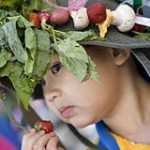Tag Health & medicine
Primate study shows excess vitamin A can be stored during fetal development
A new University of Wisconsin–Madison study suggests that pregnant women who take some types of vitamin supplements or eat fortified foods may be passing excess vitamin A to their developing fetuses. Reported in the October issue of the Journal of Comparative Medicine, the finding could guide efforts to develop future formulations of vitamins.
Researchers identify key step bird flu virus takes to spread readily in humans
Since it first appeared in Hong Kong in 1997, the H5N1 avian flu virus has been slowly evolving into a pathogen better equipped to infect humans. The final form of the virus, biomedical researchers fear, will be a highly pathogenic strain of influenza that spreads easily among humans.
‘Jumping genes’ could make for safer gene delivery system
A new nonviral gene delivery system using transposons, or “jumping genes,” provides a safer alternative to previous options, according to a publication by a UW–Madison molecular biologist and biological safety expert.
Study shows autism symptoms can improve into adulthood
Hallmarks of autism are characteristic behaviors - repetitive motions, problems interacting with others, impaired communication abilities - that occur in widely different combinations and degrees of severity among those who have the condition.
Hormone-driven effects on eating, stress mediated by same brain region
A hormone system linked to reducing food consumption appears to do so by increasing stress-related behaviors, according to a new study.
Study reveals possible genetic risk for fetal alcohol disorders
New research in primates suggests that infants and children who carry a certain gene variant may be more vulnerable to the ill effects of fetal alcohol exposure.
UW Badgers, farmers enjoy benefits of whey sports drink
When the University of Wisconsin football Badgers take the field this fall, they will have a secret weapon behind them: Wisconsin's dairy cows.
NIH MERIT award advances fetal alcohol research
Susan Smith, a professor of nutritional sciences at the University of Wisconsin–Madison, has received a prestigious MERIT award from the National Institutes of Health, which provides research funding for up to 10 years. Smith is an expert on fetal alcohol exposure, the leading known cause of mental retardation in the world.
Study: Negative views of grief counseling are not substantiated by research
A new report finds that, despite frequent claims to the contrary, there is no empirical or statistical evidence to suggest that grief counseling is harmful to clients, or that clients who are "normally" bereaved are at special risk if they receive grief counseling, according to a new look at the scientific literature on grief counseling.
American Family Children’s Hospital holds open house July 29
The time has come to “open the gift” for Wisconsin’s children and families. Four years in the making, the state-of-the-art American…
Study finds variable drug sensitivity among hepatitis C viruses
A new study from the University of Wisconsin–Madison School of Medicine and Public Health offers promise for a double-duty treatment that may provide both immune suppression and anti-HCV activity in a single drug.
Recent sightings: Have your jewelry and eat it too
As a part of “School on the Square,” undergraduates from the Dietetics and Nutrition Club help kids and their families…
Dietetics students help kids make edible jewelry at farmers’ market
UW-Madison dietetics students are working to incorporate nutrition and fresh produce into children's activities by making edible jewelry at the farmers' market.
Research may yield improved treatment for diseased lungs
A multi-institutional team of engineers, scientists and clinicians from the University of Wisconsin–Madison will study large-artery biomechanics that could play a role in heart failure in patients with pulmonary arterial hypertension.
Research aims to make it easier to serve local produce as classroom snacks
Wisconsin Homegrown Lunch, a partnership between a UW–Madison center and a local nonprofit organization, is working to introduce locally grown products into elementary schools around the area.
Decoding protein structures helps illuminate cause of diabetes
Any photographer can vouch for the difficulty of capturing a clear picture of a moving target. When it comes to molecules, however, sometimes the motion is exactly what scientists want to see.
Book explores history, causes of allergy and asthma epidemic
Why is it that actions we think will improve a situation more often than not make it worse?
Meditation may fine-tune control over attention
Everyday experience and psychology research both indicate that paying close attention to one thing can keep you from noticing something else.















